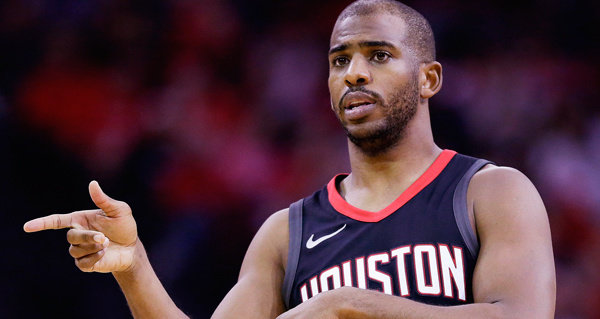Chris Paul has been a master of the old man game forever, but it now finally matches his actual age. 33 going on 34, for a six-foot-nothing guard, is something close to an expiration date. Allen Iverson was on a quarter-season retirement tour with the Sixers by that point. Tim Hardaway, Mark Price, and Mo Cheeks were all cooked or close to it. Isiah Thomas retired at 32. If you’re looking for a model of small guy longevity in the modern NBA, the obvious answer is John Stockton. When he turned 35, Jerry Sloan started resting him more, hard-capping his minutes at 30 a night.
He doesn’t take the very best care of himself. He’s not a workout freak like his friend LeBron. Paul typically shows up for the season a little puffy and plays himself into peak condition around February. On the court, he takes it easy, pushes himself only when he absolutely has to, saves everything he can for the playoffs. Teaming up with James Harden has helped ease his workload. He can take possessions off, let the MVP work while he idly spaces the floor by standing still. His balky right knee necessitates this approach, but you get the feeling Paul would have figured it out regardless. He’s a highly intelligent player, but he is also, pointedly, about expressing that intelligence. The numerous dressings down of teammates, needling refs about the finer points of the rules, until recently commanding control of every offense he’s ever run: that’s all Chris Paul insisting upon his identity as a basketball genius. You might be faster or stronger than he is, but you’re not going to outthink him.
He’s probably looking into science that can implant his brain in De’Aaron Fox’s body, but in the meantime, Paul is having to make due with a deteriorating frame, and that’s increasingly becoming a problem he can’t solve. He used to be the best point guard defender in the league. That’s now a skill he can summon only in spurts, if that. Separating himself from his opponent is more difficult than it has ever been. His leaping ability, never great, is pretty much completely gone. And there hangs over him, perpetually, the chance that he’s going to tweak something in his lower body and miss a month of games. It famously happened at the worst possible time last year, just as the Rockets were on the verge of eliminating the Warriors and Paul, personally, was extremely close to finding the kind of postseason success that had eluded him his entire career. Houston would have walloped Cleveland in the Finals, if they had found a way past Golden State. In the biggest moment of his career, Chris Paul didn’t get to have a say.
There is something acutely tragic about the greatest control freak of his generation sitting courtside, immobilized while his championship-caliber team gets bounced from the playoffs. Paul has spent a decade-plus raging against his own helplessness, trying and failing to perfectly manipulate his teammates with his mind, hiding none of his exasperation when they don’t meet his steep expectations. He’s a tennis player in a team sport, and his blood pressure is worse for it. That handsome beard, if it reflected his true inner state, would be Gandalf-white. He did his best to coach his flagging Rockets squad through two elimination games, but then he does that when he’s playing anyway. They needed him on the floor—to get Clint Capela an easy bucket, to make a single galdarned three in Game 7—and he wasn’t available. Crushing, even for a non-neurotic. It must have driven Paul to weeks-long sleeplessness.
Doubly devastating: he might never have that good a shot again. It was an ideal setup—two games to knock the Warriors out, the Rockets defending Durant, Curry, and Klay about as well as any team ever has—blown by crummy luck. Paul will always have a 99th-percentile understanding of the game, but he’s already not the player he was a few seasons ago. To say he’s going to maintain his current level for another two years would be the height of optimism and the product of punctiliously careful minutes-management. (Mike D’Antoni needs to put him on a strict Stockton Protocol yesterday.)
Paul won’t fall off a cliff unless he tears his Achilles or something like that, but he’s operating within a rapidly closing window, trending towards Barkley-dom, a ringless all-timer. There has been a sense, the whole way, that this isn’t his fault. It mostly hasn’t been. He’s gotten hurt, teammates have gotten hurt, better teams have overcome his. (That Game 5 in Oklahoma City, though, he owns completely.) An NBA career is not an individual achievement, or it is not only that. Fortune and circumstance play a huge part. Paul surely grasps this, but that’s no solace. He’s increasingly defined by the anguish produced by the gap between how he wishes things worked and how he knows they actually do. Of course all you can do is work—control the pace of play, hit a pull-up, find the open shooter—and he will, until his body doesn’t permit him to do so anymore. Chris Paul is skilled and smart and tough as hell. Is that enough? It’s not really up to him. How unfair.
More 2018 Futures: Kevin Love, Manu Ginobili, Marcus Smart, John Wall, Devin Booker, Paul George, Blake Griffin, Trae Young, Kenneth Faried, Joakim Noah, Mike Conley, Ben McLemore, Kawhi Leonard, Aaron Gordon, Danilo Gallinari, Wayne Ellington, Frank Kaminsky, Donovan Mitchell, Chris Paul, Jrue Holiday, Paul Millsap, Kris Dunn, Jimmy Butler, Joel Embiid, Victor Oladipo, Kevin Durant, C.J. McCollum, LeBron James, Giannis Antetokounmpo, Luka Doncic



